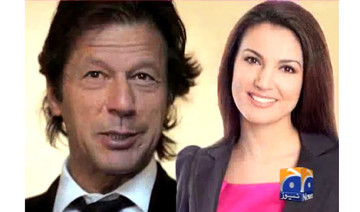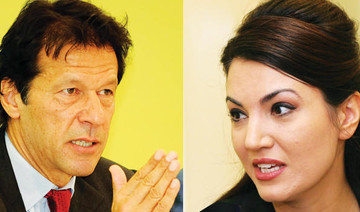ISLAMABAD: Twitter is ablaze with fiery exchanges between Hamza Ali Abbasi, an avid supporter of Imran Khan and his Pakistan Tehreek-e-Insaf (PTI) party, and the ex-wife of Imran Khan, Reham Khan.
It started on Friday when Abbasi tweeted a scathing review of Khan’s yet-to-be-released book — which leaked last week — saying he had the “unfortunate experience” of reading it.
“Had a very unfortunate experience of reading a manuscript of Reham Khans book. Here is the summary: IK is the most evil man to walk the face of this planet. Reham is the most pious righteous (TaHajjud guzaar) woman ever and Shehbaz Sharif is an amazing guy! #RehamOnPMLNAgenda”
Had a very unfortunate experience of reading a manuscript of Reham Khans book. Here is the summary: IK is the most evil man to walk the face of this planet. Reham is the most pious righteous (Tahajjud guzaar) woman ever and Shehbaz Sharif is an amazing guy! #RehamOnPMLNAgenda
— Hamza Ali Abbasi (@iamhamzaabbasi) June 1, 2018
Khan, the ex-wife of Imran Khan who was married to him for nine months, wasted no time in responding. The British-Pakistani journalist accused Abbasi of threatening her for close to a year, saying the only way he could have gotten his hands on her manuscript was through fraud or theft. She also released screen shots of what she said were email exchanges between Abbasi and herself.
“Hamza has been emailing me threats since August 2017. Bullies trying to silence me,” she tweeted.
Had a very unfortunate experience of reading a manuscript of Reham Khans book. Here is the summary: IK is the most evil man to walk the face of this planet. Reham is the most pious righteous (Tahajjud guzaar) woman ever and Shehbaz Sharif is an amazing guy! #RehamOnPMLNAgenda
— Hamza Ali Abbasi (@iamhamzaabbasi) June 1, 2018
Abbasi denied the emails Khan posted were from him, while Khan (and many of her Twitter followers) pointed out the ones he was posting had spelling errors in the email addresses, fostering claims the documents were doctored.
As the Twitter exchange between the two continued to heat up, neither side appeared to be willing to back down.
Khan accused Abbasi, an actor, of being upset because he was not cast in her film “Janaan.”
Abbasi retaliated, mocking her show and threatening to start discussing parts of her book on SAMAA TV on Monday.
“Seriously? LOL hahahahahahaha Hero in Janaan? NA49? Anyhow, the debate you wanted to have right before elections will happen NOW & fizzle out in a few days till you & the pile of lies you call ur book become irrelevant! Will start discussing ur book content from Monday.”
Seriously? LOL hahahahahahaha Hero in Janaan? NA49? Anyhow, the debate you wanted to have right before elections will happen NOW & fizzle out in a few days till you & the pile of lies you call ur book become irrelevant! Will start discussing ur book content from Monday. pic.twitter.com/KqlPndaLSx
— Hamza Ali Abbasi (@iamhamzaabbasi) June 2, 2018
The escalating exchange of words has prompted PTI’s Central Information Secretary Fawad Chaudhry to step in.
Chaudhry claimed his party had proof that Khan had met with Maryam Nawaz Sharif, a politician and daughter of former prime minister Nawaz Sharif, adding fuel to allegations that Khan’s book was part of a smear campaign against Imran Khan, and that she was playing into the hands of the Pakistan Muslim League-Nawaz (PML-N) party.
“We now have solid evidence to prove Reham Khan was meeting @MaryamNSharif through Ahsan Iqbal @betterpakistan so the whole book is an exercise to demolish only real opposition i.e #PTI #RehamOnPMLNAgenda”
We now have solid evidence to prove Reham Khan was meeting @MaryamNSharif through Ahsan Iqbal @betterpakistan so the whole book is an exercise to demolish only real opposition i.e #PTI #RehamOnPMLNAgenda
— Fawad Hussain (@fawadchaudhry) June 2, 2018
Ahsan Iqbal, a member of PML-N, did not take too kindly to being thrown into the discussion either. In a tweet, which was retweeted by Khan herself, he denied claims he was involved in facilitating a meeting between Khan and Nawaz.
“Most shameful PTI resorting to fabricated and distorted emails to defend itself. Neither I ever met Reham Khan except for an interview in Aaj Studio before her marriage with IK nor arranged her meeting with anyone. Pl don’t drag me in matters between ex spouses.”
With only a few weeks left before Pakistan’s elections on July 25, the impact of the inside scoop about the life of PTI leader Imran Khan. through the eyes of his ex-wife in her new book, is undeniable.
While the Twitter exchange between Khan and Abbasi has slowed down, the latter’s threat that he will be taking his thoughts and selected passages from the book to the airwaves on Monday is expected to garner more media attention on the book.
Meanwhile, Khan says her book will be released in June as planned.





















